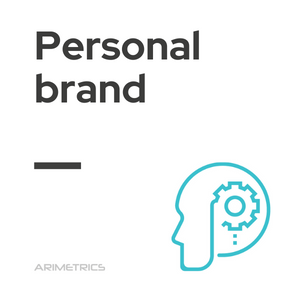Definition:
Personal branding
is the process of creating a recognizable professional name, as well as reputation, for a person or company. It is a combination of how one or a company presents itself through the different media and how customers remember it after having offered a service.
Personal branding is essentially the process of establishing a prescribed image or introducing into the minds of others something relative to an individual, group, or organization. Personal branding often involves applying a person’s name to various products.
The relationship between brands and consumers needs to be constantly made and remade, and this ongoing process creates a demonstration of ambivalence in brand cultures. This same logic is deduced from personal brands, where there is a constant desire for a reinforcement of the brand itself.
How to build a personal brand
Building a personal brand and an online presence through internal corporate networks allows individuals to connect with colleagues in both social and professional ways. This type of interaction not only facilitates personal branding in relation to other employees, but also fosters innovation within the company, as more people can learn and benefit from the experiences of their peers. Collaboration and the exchange of ideas are critical to personal and professional growth, and a well-defined personal brand can serve as a catalyst for these interactions.
To build an effective personal brand, it is important to clearly define the values, skills and goals you want to communicate. This can include creating a professional profile on platforms such as LinkedIn, where you can highlight your experience and accomplishments. In addition, participating in relevant social media conversations, sharing valuable content and making connections with other industry professionals are practices that can strengthen the personal brand.
The personal brand of Social Networks
Social networks, such as X (formerly Twitter), offer platforms where both professional and personal connections can be made. Due to its public nature, Twitter becomes a versatile tool that can be used in a variety of ways, depending on the level of censorship a user chooses to self-impose. This allows individuals to develop their personal brand according to their goals and the image they wish to project to the world.
In social media, authenticity is key. Users should be aware of how their posts, comments and the way they interact with others can influence the perception of their personal brand. Sharing experiences, knowledge and opinions in a genuine way can help build a community of loyal followers. In addition, it is critical to properly manage online reputation, responding to comments and criticisms in a constructive manner and maintaining a consistent presence aligned with personal values.
Benefits of personal branding
Among the benefits of working on personal branding we can point out the following:
- Differentiation in the marketplace: In an increasingly competitive world of work, a well-defined personal brand allows an individual to stand out from the crowd. By highlighting unique skills, experiences and values, an identity can be created that attracts the attention of employers, clients and colleagues.
- Credibility and trust: A strong personal brand helps establish credibility in the professional field. By sharing knowledge and experience consistently, you build trust with your audience. People tend to trust more those who have an authentic and consistent presence, which can result in job opportunities and collaborations.
- Career opportunities: An effective personal brand can open doors to new opportunities. Whether through job postings, collaborations, conferences or projects, a well-managed presence can attract the attention of recruiters and companies interested in the talent and expertise on offer.
- Expanded networking: Personal branding facilitates the creation and strengthening of professional relationships. By interacting and sharing content on social media and other channels, you can connect with industry influencers and colleagues, which can lead to valuable networking opportunities.
- Control over personal narrative: By developing a personal brand, you have the power to control how you are perceived by others. This allows you to manage your image and reputation, ensuring that you effectively communicate what you want others to know about you.
- Skills development: The process of building and maintaining a personal brand often involves acquiring new skills, such as effective communication, social media management and personal marketing. These skills are valuable and can be applied in various areas of professional life.
- Personal satisfaction: Finally, building a personal brand can be a source of personal satisfaction. By aligning one’s brand with one’s values and passions, one can create a greater connection to one’s work and professional life, which contributes to a greater sense of purpose and fulfillment.

